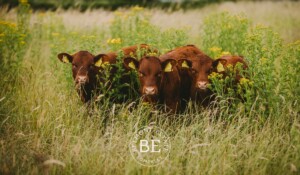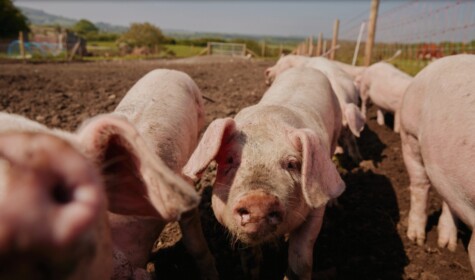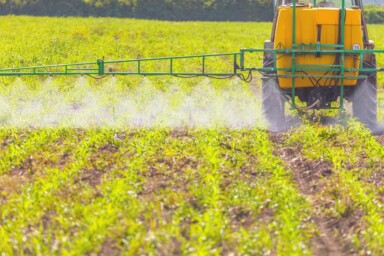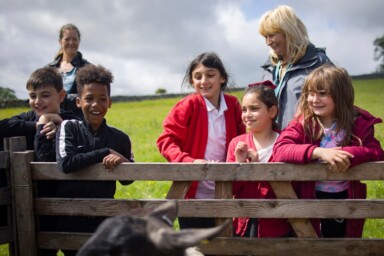In June of last year, the Sustainable Food Trust embarked on a new pilot project in partnership with the College of Medicine and the University of Bristol, to connect General Practices (GPs) with working farms close to Bristol. The project was inspired by the (then) Prince of Wales’s belief in the potential for engagement with nature and sustainable food production to improve individual health and healing.
Much like Care Farming, which is defined as the ‘therapeutic use of farming practices’, our project fit under the umbrella of ‘green social prescribing’ – the term used to describe the process of connecting people to nature-based interventions and activities, such as community gardening and food growing projects. Social prescribing is an approach to healthcare already available in many GP practices across the UK, whereby patients are connected to activities and services in their community that meet their health and wellbeing needs.
The College of Medicine, founded in 2010 to reform healthcare, has been campaigning for Government to end the over-prescription of medication in the National Health Service (NHS). Social prescribing provides healthcare practitioners a means of offering personalised solutions to help with the social, emotional and practical needs of patients, and the idea has been gaining recognition in recent years. In fact, this year, the NHS is planning to revolutionise healthcare, moving away from the “pill for every ill” mentality, towards preventative and integrated approaches to health. The scheme, set to be unveiled this spring, will set out alternatives to routine medication, such as free gym memberships, meditation classes and gardening groups. It is thought that the scheme will save the NHS millions of pounds each year.
 With this in mind, it felt like an appropriate time to be considering the beneficial role that farm-based green social prescribing could play in improving public health and wellbeing. We began by reaching out to farms in the Bristol area to identify appropriate sites that met our criteria; the farms were, ideally, to be organic or regenerative, nature-friendly and with an abundance of wildlife. Equally as important to the success of the project, was the individual at the farm who would be responsible for leading the sessions. Thankfully, we quickly found two well-suited farms within easy reach of the city. Watercress Farm (part of the Belmont Estate) provided a nature-rich, regenerative landscape, with areas that have been rewilded and rewetted to increase biodiversity and combat climate breakdown. A herd of free-range cattle, as well as pigs and ponies roam the natural pastures, riverside meadows and dense woodland. The landscape provided opportunities for participants to learn about the approach to land management, whilst being immersed in nature.
With this in mind, it felt like an appropriate time to be considering the beneficial role that farm-based green social prescribing could play in improving public health and wellbeing. We began by reaching out to farms in the Bristol area to identify appropriate sites that met our criteria; the farms were, ideally, to be organic or regenerative, nature-friendly and with an abundance of wildlife. Equally as important to the success of the project, was the individual at the farm who would be responsible for leading the sessions. Thankfully, we quickly found two well-suited farms within easy reach of the city. Watercress Farm (part of the Belmont Estate) provided a nature-rich, regenerative landscape, with areas that have been rewilded and rewetted to increase biodiversity and combat climate breakdown. A herd of free-range cattle, as well as pigs and ponies roam the natural pastures, riverside meadows and dense woodland. The landscape provided opportunities for participants to learn about the approach to land management, whilst being immersed in nature.
The second farm in our pilot, Yew Tree Farm, is the “last working farm in Bristol”. It is a nature-rich, wildlife-friendly farm, producing high quality, organic, seasonal produce, including pork from their home-bred pedigree Welsh pigs. The natural hay meadow with over 90 plant and grass species, home to hundreds of insects and birds, as well as the mature trees, copses, hedgerows and woodland, provided plenty of opportunity for nature-based activities such as foraging and wildlife identification.
Alongside establishing a programme of activities with the farms, we worked with Social Prescribing Leads and Link Workers to recruit participants. We wanted to keep the inclusion criteria for participants as broad as possible, whilst recognising that some people might have no experience of being on a farm or of being in close contact with animals.
Once the groundwork had been laid, the 12-week programme launched in September, with a maximum of six attendees each session at each of the two farms. Participants were taken by taxi to the farms, for two-hour sessions on a fortnightly basis, whereby they engaged in a range of activities including farm walks, interaction with farm animals, nature-identification, meditation and foraging, as well as opportunities to simply sit and take in the sights, smells and sounds of the farm.
During the project, we carried out an evaluation, comprising participant questionnaires and informal interviews with all involved. The qualitative data collected demonstrates great enthusiasm for the project, with participants and staff reporting that they enjoyed the experience and hoped it would continue. Many also referenced how much they enjoyed engaging with farm animals. Amongst the health benefits noted were improved mental health and reduced social isolation, thanks to socialising with others, as well as being immersed in nature, fresh air and in a beautiful setting.
Despite many successes, we also encountered challenges along the way, with participant recruitment lower than initially hoped. This was felt to be due to a variety of factors, including time of day, transport, mobility restrictions, and the colder weather. Thankfully, we are engaging in a second project this spring, when the weather will hopefully encourage greater participation.
There is still much that can be learned through further trials and interaction with others experienced in therapeutic farming – including the care farming community. However, we hope that this ongoing project and evaluation acts to highlight the role that farms can play in improving individual health and wellbeing, and that government will take seriously the opportunity that green social prescribing on farms represents.
Featured photo of pigs at Yew Tree Farm. Photos of cows and campfire courtesy of Belmont Estate.








